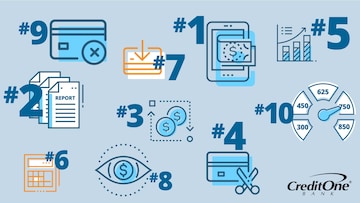August 13, 2018
Topics:
Credit ScoreDid you know it’s not possible to have a credit score of zero? If you didn’t, you’re like over half of the respondents asked this question in a recent survey.

Did you know it’s not possible to have a credit score of zero? If you didn’t, you’re like over half of the respondents asked this question in a recent survey.
This question was one of 24 true/false credit questions we ran by roughly a thousand of our card members to get a better idea of their levels of credit knowledge. Some of their responses demonstrated impressive credit savviness, while others made it clear that we—and other content creators—need to do a better job of educating our readers on certain subjects.
What follows are 24 questions we asked our card members, their responses, and the correct answers. Feel free to quiz yourself to see how knowledgeable you are on credit matters—and to identify subject matter that may require more research on your part.
1. Credit scores and credit reports are not the same thing.
- 84% answered True
- 16% answered False
Answer: True.
While your credit score is based on information contained within your credit report, they are not the same thing. One is an actual report showing your credit history and activity; the other is a three-digit number lenders use to “score” your creditworthiness.
2. Everybody has a credit report.
- 61% answered True
- 39% answered False
Answer: False.
If you have no credit history, you will not have a credit report and, consequently, also not have a credit score. It is possible, however, to have a credit report but no credit score due to limited or no recent activity on your credit report.
3. You have more than one credit report.
- 93% answered True
- 7% answered False
Answer: True.
If you have enough credit history to have a credit report, you may have three separate versions: one from Experian®, one from TransUnion®, and one from Equifax®.
4. You have more than one credit score.
- 90% answered True
- 10% answered False
Answer: True.
If you have enough credit history to have a credit score, you should have at least two credit scores: a FICO® Score and a VantageScore®.
5. It is not possible to have a credit score of zero.
- 49% answered True
- 51% answered False
Answer: If you read the opening paragraph, you already know the answer to this one is True.
The two most popular credit scoring models—FICO® Score and VantageScore®—both use a range of 300 to 850 to calculate credit scores, so 300 is the lowest possible score. While it’s not possible to have a score of zero, it is possible to simply not have a credit score due to a lack of credit history.
6. A credit report is opened for you when you get a Social Security number.
- 61% answered True
- 39% answered False
Answer: False.
Although your credit report is linked to your Social Security number, you don’t actually get a credit report until you have some credit activity to report. Requesting a Social Security number for your child will not automatically open a credit report for them as well.
7. Credit reporting agencies are government agencies.
- 19% answered True
- 81% answered False
Answer: False.
Credit reporting agencies are private companies, not government agencies. The big three are Experian, TransUnion, and Equifax.
8. Married couples have joint credit reports.
- 20% answered True
- 80% answered False
Answer: False.
Even after you get married, you’ll continue to have your own credit report. Your spouse’s credit activity will only be reflected in your credit report if you take out credit in both of your names, say, getting a mortgage in both of your names or one of you cosigning a on loan for the other.
9. Derogatory information, such as a bankruptcy, can stay on your credit report 7-10 years.
- 97% answered True
- 3% answered False
Answer: True.
More respondents answered this question correctly than any other one in the survey. This is why it’s so important to consistently make payments on time. Even a single late payment can remain on a credit report for up to seven years.
10. Your age, sex, and marital status are listed on your credit report.
- 47% answered True
- 53% answered False
Answer: False.
Nope, none of this information shows up in your credit report.
11. Paying off the outstanding balance of a past-due account removes any information from your credit report indicating the account was ever past due.
- 11% answered True
- 89% answered False
Answer: False.
Your credit report will show that the balance owed was paid, but it will still reflect the past-due status the account reached for up to seven years.
12. Creditors are not obligated by law to report your credit activity.
- 45% answered True
- 55% answered False
Answer: True.
There’s no law forcing creditors to report your credit activity. It’s completely voluntary.
13. Anyone can view your credit report because it’s public information.
- 14% answered True
- 86% answered False
Answer: False.
Your credit reports are not available for general consumption, and they are not considered public information. The federal Fair Credit Reporting Act and state laws restrict who can access your credit report and how it can be used.
14. A bankruptcy on your credit report is more damaging than an account that’s 90 days past due.
- 50% answered True
- 50% answered False
Answer: False.
Both of these events affect the calculation of your credit score—and how potential creditors view your risk level—about the same.
15. In calculating your credit score, you start with a perfect score and then points are subtracted based on your credit behavior.
- 45% answered True
- 55% answered False
Answer: False
Several factors go into calculating your credit score, but you don’t start with a perfect score and then get docked points for bad behavior.
16. The most important factor in calculating your credit score is consistently paying your bills on time.
- 94% answered True
- 6% answered False
Answer: True
We couldn’t be more pleased that such a high percentage got this one right, because we preach it most every chance we get. It makes up 35% of your FICO Score, so get those payments in on time, every time!
17. Employers cannot view your credit report without your permission.
- 76% answered True
- 24% answered False
Answer: True
You have to give a potential employer permission to view your credit report, and even then they only get access to a modified version, not the same credit report potential lenders see. You’re not obligated to give potential employers permission, but keep in mind that refusing them may make them feel as though you have something to hide and take you out of the running for the job.
18. Employers can view your credit score.
- 59% answered True
- 41% answered False
Answer: False
Our results may be a case of “score” and “report” being used interchangeably, but a potential employer cannot view your credit score. Now, if you give a potential employer permission to view your credit report (see previous question), and your report is rife with derogatory information, they’ll probably put two and two together and figure that your credit score isn’t great, but they can’t access your actual credit score when screening you.
19. Your geographic location does not impact your credit score.
- 62% answered True
- 38% answered False
Answer: True
Where you live has no bearing on your credit score. Although your credit score could have some bearing on where you end up living.
20. Your credit score could affect your auto insurance rates.
- 84% answered True
- 16% answered False
Answer: True
This fact has been getting quite a bit of play in the media lately, and it looks like it has made its way into the consciousness of most of our card members. Many insurers use credit scores to calculate premiums because there’s a correlation between credit score and the likelihood of filing a claim.
21. Checking your own credit score will lower your score.
- 18% answered True
- 82% answered False
Answer: False
We preach this fact nearly as much as we do the importance of paying your bills on time, so it’s nice to see that over eight out of 10 of our card members realize there’s no negative impact in checking their own credit score.
22. Closing a credit card account could lower your credit score.
- 75% answered True
- 25% answered False
Answer: True
Doing so could increase your credit utilization ratio and reduce the length of your credit history, both of which can contribute to lowering a credit score. You may want to consider just leaving the account open and only using it once in a while to keep the creditor from closing it due to lack of use.
23. Increasing your income will increase your credit score.
- 25% answered True
- 75% answered False
Answer: False
Your credit score is not income dependent. A lender will almost certainly consider your income in deciding whether to extend you credit—or how much credit to give you—but your income will not affect your actual credit score.
24. If you get divorced, your ex-spouse’s activity cannot affect your credit score.
- 30% answered True
- 70% answered False
Answer: False
A divorce does not break any contracts you have with lenders. So even if you’re legally divorced, if you have loans or other credit accounts in both of your names, your ex’s activity can affect your credit report and credit score.
It’s important to contact any lenders with whom you have joint accounts to see if you or your spouse can transfer the account into only your or their name. If you can’t, try to close the account to any additional charges until you can pay it off and close it. You’ll also want to remove your ex-spouse as an authorized user from any of your credit card accounts, if they still are one.
After realizing he couldn’t pay back his outrageous film school student loans with rejection notices from Hollywood studios, Sean focused his screenwriting skills on scripting corporate videos. Videos led to marketing communications, which led to articles and, before he knew it, Sean was making a living as a writer. He continues to do so today by leveraging his expertise in credit, financial planning, wealth-building, and living your best life for Credit One Bank.



